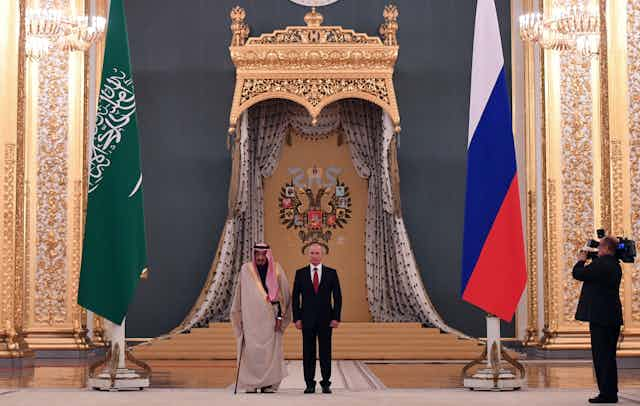As the whistle blows to announce the start of the 2018 World Cup, two heavyweights will go head-to-head. Neither Russia nor Saudi Arabia, who play each other in the opening game, are football superpowers, with both falling well outside the top 50 of FIFA’s world rankings. Yet both states are aspiring political heavyweights, shaping the world through the production of oil and gas and exerting their influence across the Middle East and Eastern Europe. And the leaders of the two countries will meet in Moscow ahead of the match.
Russia and Saudi Arabia originally enjoyed positive relations, and the Soviet Union was the first state to recognise Ibn Saud – the Kingdom’s founding father – as the King of the Hijaz and Sultan of Nejd in February 1926. Yet things dramatically changed during Joseph Stalin’s domestic purge in the 1930s, after the Soviet ambassador to Saudi Arabia was recalled, arrested and executed.

The two nations have since endured a frosty relationship. Competition can be traced back to the Cold War, during which time Saudi Arabia allied itself with the US in an attempt to ensure its security from a range of threats including Pan-Arabism, Iran, Iraq, and communism.
The Soviet Union’s ideological stance of seemingly militant secularism was also vehemently at odds with the Kingdom’s staunchly Islamic raison d’etre, with Wahhabism – a fundamentalist interpretation of Islam – imbued within the fabric of the Saudi state as a means of ensuring its survival. When asked in the 1960s why Saudi Arabia did not have an embassy in Russia, King Faisal replied: “Go to Moscow and tell them to recognise God, and tomorrow I shall open an embassy in Moscow.” Such comments reveal the distance between the two states ideologically, and their position on opposing sides during the Cold War.

In recent years, the two states have found themselves on opposing sides of the conflict in Syria, which has taken on huge geopolitical significance for both. For Moscow, ensuring the survival of the Assad regime is of paramount importance. Russia wants to maintain a permanent presence in Syria including use of the Tartus port on the Mediterranean, and reports claim it has agreed a deal with Damascus to extend its presence there for a further 49 years.
For Saudi Arabia, removing Assad from power would be an important step in reducing the power of Iran across the Middle East. Saudi Arabia and Iran have long been engaged in an increasingly existential rivalry that has manifested itself most obviously – and most devastatingly – in Syria.
A new alliance – over oil
Historically, tensions between Moscow and Riyadh played out through oil cartel OPEC. Russia, only an “observer” not a full member, traditionally wanted to limit output, while the Saudis sought to use their vast oil reserves against Iran. Though Iran also has lots of oil, its reserves are less accessible, and so Iran requires the price of oil to be higher than Saudi Arabia to make a profit on each barrel. Keeping the output high and prices low was therefore one way the Saudis could curtail Iran’s regional influence.
Nonetheless, in late 2016 Russia and Saudi Arabia struck a deal to limit oil production, in a marked shift of policy for the kingdom. This was followed by a number of other deals between companies in the two states, with a US$1 billion energy investment fund alongside a US$1 billion hi-tech investment fund – a paltry sum compared to economic ties between the kingdom and the US – and increased military links.
What is behind such burgeoning co-operation? The kingdom is in economic trouble and needs to raise a great deal of working capital – and later, investment – for its Vision 2030 initiative, which is designed to help the transition into the post-oil era. It also wants to increase the price of oil ahead of its national oil firm Saudi Aramco being listed on the stock exchange.
Perhaps most interesting of all is that Russia’s deal with the Saudis heralds a potential policy shift away from its long-time ally Iran. We should remember that Russian-Iranian relations were never as positive as people assumed. With a diminishing US role in the Middle East, Russia has sensed an opportunity to increase its influence across the region, while Saudi Arabia perhaps views an opportunity to weaken Iran by wooing Russia.
All of this points to a period of uncertainty for states across the region but in particular Iran and the US. Iran are in Group B in the World Cup and so are unlikely to play either Russia or Saudi Arabia in this tournament, while America failed to qualify. But in Moscow and Riyadh a great geopolitical game is just kicking off.
More articles about the World Cup and politics, written by academics:

